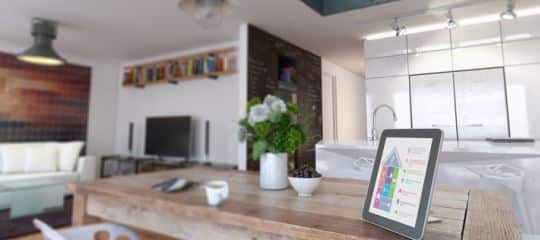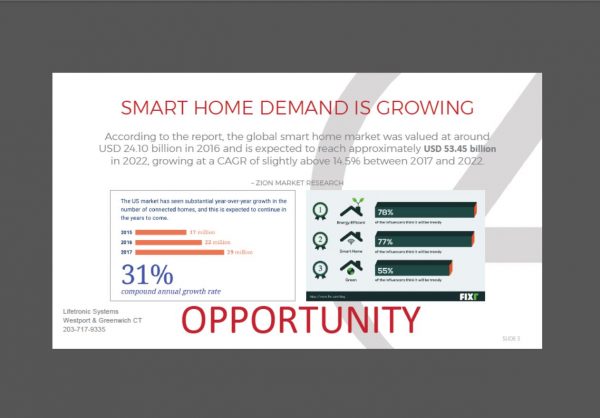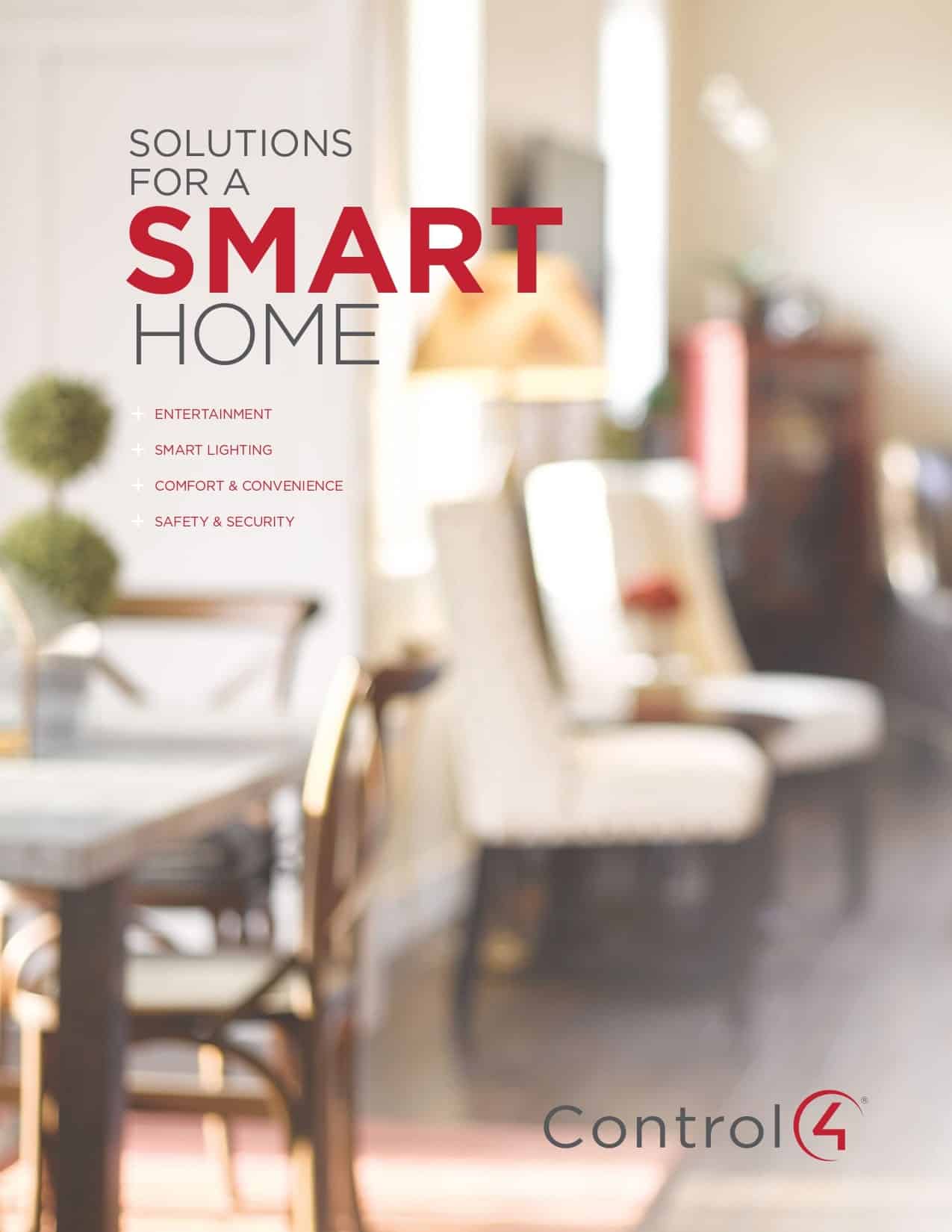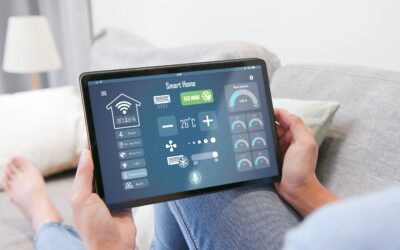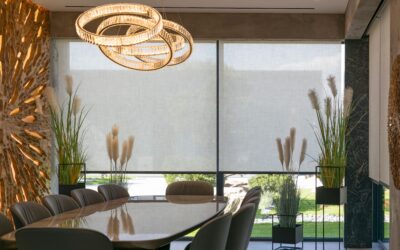Architects and builders across America are joining the smart home revolution for a variety of reasons, but the primary one is that across the board, smart homes attract buyers and increase profitability. If you’re a builder or architect, here are all five reasons why you should consider joining the smart home revolution.
Reason #1: Boost Your Profit Potential
According to the Consumer Technology Association (CTA), Smart Home products and technology are at the top of consumer’s wish lists for new homes. For builders and architects that means integrated technology is an excellent way to boost profitability for new construction. More than a third of builders report that home theater pre-wiring helps increase profits, with profit potential also increasing for security and structured wiring installations.
According to the CTA, in 2017 Wi-Fi–enabled choices like doorbells, thermostats, cameras, lighting, and locks were the most in-demand tech products last year. Their popularity will likely continue to rise. This year, CTA expects sales in this category to increase 41% over 2017 to nearly 41 million units. Builders say the reason for tapping into tech products is simple: It’s what their buyers want.[1]
- The CTA says more builders said their decision to install and offer technologies in new homes was driven, in part, by the increase in profit potential compared to previous years
- More builders cited architect and/or buyer specifications as top reasons to install home technologies. The role architects, in particular, play in the decision to install home technologies began to increase in 2014 and has grown every year since.
- 35% of builders reported that installing home theater pre-wire/systems helped boost their future profit potential
- 26% of builders said installing monitored security helped boost their future profit potential
- 25% said structured wiring helped boost their profit potential
- There will be 73 million smart homes in the U.S. by 202. That’s 55% of homes.[2]
- Approximately one in three (32%) builders says installing home technologies has increased their revenue. Custom, regional, apartment, and luxury builders are more likely to have experienced revenue increases as a result of installing home technologies.
Reason #2: Gain a Competitive Edge
A study from Houzz showed that 45% of renovating homeowners incorporate smart technology, but there’s an even larger untapped market available: new home construction. [3] When given a choice between an average home and one set up with smart technology, today’s tech-savvy home buyers choose smart homes.
Reason Three: Keep Up with Consumer Demands and Preferences
Builders and architects are continuing to incorporate smart home automation into their building plans by working with home automation experts to develop smart device-friendly plans not just for the profitability, but because of consumer demand.
A proactive approach to home automation planning keeps builders from having to backtrack and it prepares architects for homeowners who know from the start that they want fully automated smart homes.
Reason #4: Avoid Rework
Consumers don’t want a home filled with wires draped from walls and running from room to room in a wiring clutter. They want all the benefits of smart devices without the clutter of cords and cables. They also want to feel confident that the technology they plan to bring to an entertainment room, or home office, will keep up with their demands and devices.
The best way time to fully automate a home is during construction. Neither builders or homeowners like to go back in and install wiring that could have been installed during the original construction. It’s important to meet with a home automation expert who knows the questions, layouts, demands, and options that ensure that the homebuyer understands and is getting what they want from their home.
Reason #4: Keep Current with Wiring Technology
Today’s technology wiring requirements exceed those of homes built even 20-25 years ago. The standard wiring setup simply doesn’t cut it for today’s demanding devices, or the ones on the horizon. When homes are completed without current A/V wiring, the homeowner either has to run visible wires themselves, or builders have to go back in and rewire the home.
Architects say the most frequently requested, designed, and installed automated systems are:
- Monitored security
- Multi-room audio
- Home theaters
- Home Offices
Each of those kinds of systems demands different wiring, designs, and power. If you’re a builder or architect it’s always important to know what the end user’s preferences and vision for each space. Having that conversation, in general, is vital. But, it becomes even more critical when you bring smart home automation into the mix. Not only do you need to know the purpose of each room, but you also need to know the technology they want to use in each area, whether it’s computers, 4K Ultra High Definition televisions, wireless printers, appliances, a network, or other smart devices, and what kind of wiring will support that technology. Conventional wiring simply can’t keep up with the power demands those devices require.
Reason #5: Get a Head Start on the Future
In the most recently reported period, over 106 million U.S. households had fixed broadband internet access, up from close to 80 million in 2009. The United States is one of the biggest online markets worldwide, coming in behind China, but closing fast on broadband in every home.[4]
Because broadband Internet is now a standard feature in 73% of homes in the U.S. it’s safe to say it’s not a trend and the Internet, in some form or fashion, will be with us for a long time.[5] The day is coming when every home will have a standard broadband connection, so homeowners have a home where they can work, relax, entertain, and control their environment. Getting on board with that reality gives builders and architects a head start on the future.
Forbes says that there are 53 million freelancers in America today and that by 2020, 50% of the U.S. workforce will be freelancers (this doesn’t necessarily mean they will all be full-time freelancers, but that one of every two workers will be freelancers in some capacity).[6] This, in turn, means a greater demand for home automation that can create a technology ecosystem that can keep up with the demands of the future workers.
If you’re ready to learn more about full home automation systems, and what they mean to your business or clients, contact us here at Lifetronic.
Download the Smart Home Price List for Builders
Installation of smart home technology is now more affordable than you think! Download our free price list.[1] https://www.builderonline.com/products/home-technology/the-smart-home-revolution_o
[2] https://www.builderonline.com/products/home-technology/the-smart-home-revolution_o
[4] https://www.statista.com/statistics/183614/us-households-with-broadband-internet-access-since-2009/
[6] https://www.forbes.com/sites/brianrashid/2016/01/26/the-rise-of-the-freelancer-economy/#5e9f69e93bdf
